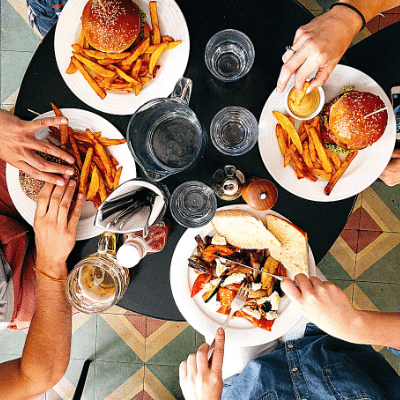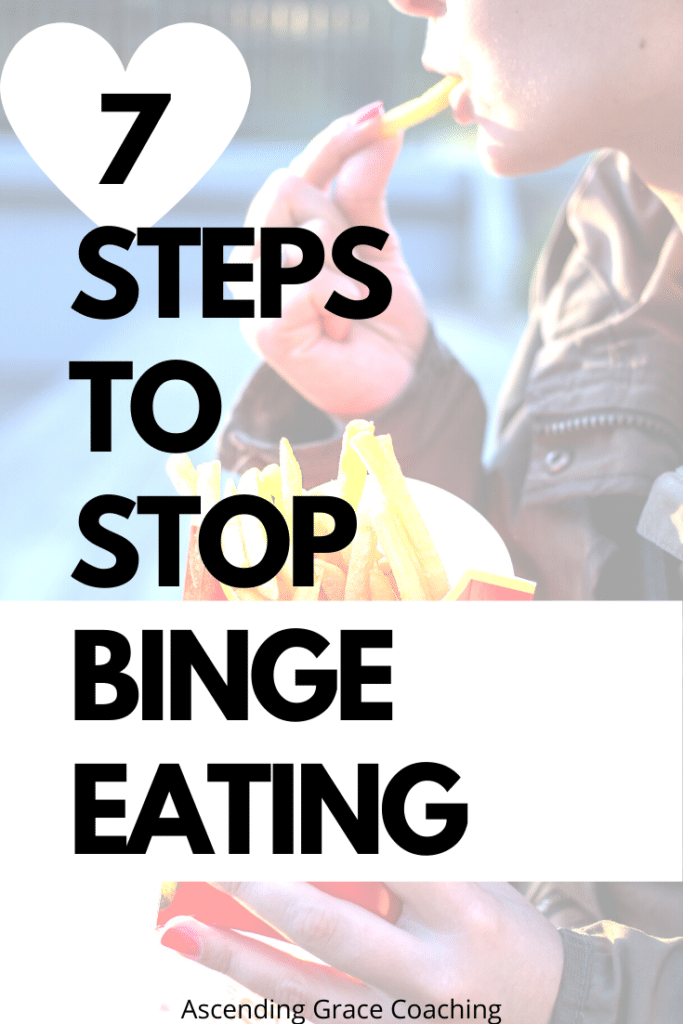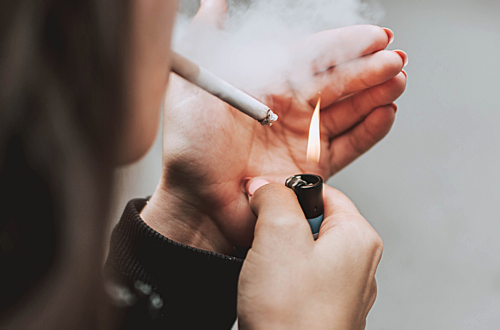
Binge Eating: How To Be Healthier In 2021 (For Free)
Binge eating during the holidays can feel really good, but its not good for that new years eve outfit or for your 2021 goals!
During the holidays, everyone is over-indulging with alcohol, food and spending.
It’s basically a guilt free pass, until the holidays are over.
“I’ll stop after New years,” you tell yourself.
The problem is you have been overeating since Halloween or Thanksgiving… of 2016.
Now your ‘little splurge’ is a habit.
And habits can be tough to break.
The problem with binge eating isn’t weight gain.
The problem with binge eating is your emotions.
It is an emotional problem, not an eating problem.
Emotional eating is eating in response to a positive or negative emotion.
At some point or another we all emotionally eat.
Think about how often you eat when you get hangry.
See, we all do it.
Emotional eating is pretty much unavoidable.
That is why I am not going to tell you to stop emotional eating.
Instead, I am going to show you how to become aware of your emotional eating cycles.
Why quitting emotional eating doesn’t work:
- Quitting emotional eating isn’t a permanent solution.
- Suggesting you stop emotionally eating is setting you up to fail.
- It is too difficult to not emotionally eat at one point or another.
- Emotionally eating on occasion is not the problem.
- It is not the reason you have gained weight.
You have gained weight because you have repeated the emotional eating cycle.
When you are in an emotional eating cycle, you have created a habit out of overeating, in reaction to your triggers
Emotional eating triggers look like:
- Eating to connect with others- This looks like centering your social interactions around food.
- Rewarding yourself with food- You have done good for a time, so you feel you can now reward your good behavior with binge eating.
- Punishing yourself with food- You fail at something, so you overeat and fail at your diet, to stay consistent with being a ‘failure’. The brain loves consistency.
- Numbing- you feel a negative emotion and overeat to soothe it.
- Powerlessness- You feel out of control about an aspect of your life and so you binge eat to feel in control again. In essence you are in control of how much food you allow yourself to eat.
What are triggers?
Triggers are a circumstance that leads to a thought.
This thought creates an emotion.
The emotion is what causes you to act and it is then this action that creates your result.
For example: You are at a party where everyone is drinking (circumstance). You are sitting on the couch and think you should get involved (thought). You start feeling isolated and awkward (emotion), so you head over to the appetizers (action) and make small talk. You realize at the end of the night that you ate too much and begin to stress about it (result). I may even eat more to avoid the guilt of overeating in the first place (cycle).
These triggers become cycles once you repeat them over and over.
Every time you encounter the trigger you react with overeating you have once again repeated the cycle and compound your unwanted result.
So how do you stop the overeating cycle?
Just stop…
Haha totally kidding. That’s awful advice!!

Here are 7 steps and ONE BONUS to break your overeating habit.
Become aware of your overeating habit.
You may not even realize you have been in an binge eating cycle this whole time.
You may just feel like you want to lose weight or eat healthier.
So, you are aware a change needs to be made, but aren’t sure where to make the change.
Put another way, you aren’t sure which of the triggers (listed above) that you are reacting to.
RESOURCES:
Create a new reaction.
Once you have found your emotional eating trigger and cycle, you need to create an alternative reaction.
So, instead of overeating in reaction to your feelings, you need to plan ahead of time what you will do instead.
For example, if you use eating as a reward, then plan to reward yourself with self-care or an activity.
Practice a new reaction.
Once you have decided how you will react to your trigger, you need to practice doing it.
What I see happening is, clients coming up with plans, but not following through when they are triggered.
In the heat of the moment, they let their emotions be in control and forget about the plan.
That is why you need to practice your reaction.
Chances are, in the heat of the moment, you will forget.
You may get overwhelmed or give in to your emotions and end up not acting according to plan.
That’s ok.
Just remind yourself and plan to do better the next time.
RESOURCES:
Plan your binge eating in advance.
It’s important to plan your overeating.
Remember emotional eating isn’t bad.
Being in the habit of emotional eating is what gives you undesirable results.
Don’t tell yourself no more overeating, ever.
That will just make you want to overeat more.
Instead say to yourself, “I can eat whatever I like, whenever I want. I just need to plan it in advance.”
When you plan to indulge, you can also plan for how much to indulge.
When you indulge in the moment, you are eating in reaction to something and are not in control.
You are not thinking about your future self when you react and do things impulsively.
So instead of telling yourself, “that’s off limits,” say, “I can have that when I plan for it.”
Allow urges
When you practice your new reaction, your old reactions and urges don’t just go away.
They will be there, and they will be strong.
Learning something new is always hard at first, but then it gets easier.
It becomes second nature.
That is all your urge is.
It’s a thought you have practiced over and over.
All you have to do is begin rehearsing another, better thought to get rid of it.
You can replace it whenever you commit to doing so.
You can decondition yourself to respond this way by overriding your reaction with a new reaction.
RESOURES:
Practice feeling negative emotion.
Quitting overeating is easy, it’s experiencing the negative emotion that is most people find difficult.
They resist their negative emotions and try to make themselves feel better with food.
The key to allowing your urges is to not resist negative emotions.
All emotions are neutral.
Its what we make them mean that produces a positive or negative result in our lives.
Check in with yourself when you are feeling triggered and decide whether you are: 1) reacting, 2) avoiding, 3) resisting, or 4) experiencing your negative emotions.
Allowing urges and negative emotions simply mean not reacting to them.
Fail Forwards
Don’t make failing mean something bad.
You learn something every time you fail, so it can’t a bad thing.
If you make failing mean something bad, your result will also be bad.
If you make it mean something good, your result will be good.
Take your failure and decide what new information it has revealed to you and turn this new information into insight on how to better and succeed next time.
The more failures you have the more opportunities you receive.
Plan for a least a few failures every time you set a goal, the more the better.
The more you experience failure the further you will go in life and the faster you will succeed!
The more you fail, the more times you have tried to succeed.
RESOURCES:
Final thoughts:
Here is a breakdown of what you just learned:
- Become aware
- Create a new reaction
- Practice your new reaction
- Plan your overeating
- Allow urges
- Experience your negative emotion
- Failing forwards
BONUS STEP:
The most important thing you can do in this process, is not beat yourself up.
Beating yourself up lowers your self-worth.
Self-worth is the single most important thing you need to succeed at anything.
That and never giving up.
Don’t lose weight or do anything in life if its fueled by negative self talk and lack.
You may be successful at reaching your goals, but you wont feel good.
Every desire you have in life is really just a feeling you want to experience.
You don’t have to wait for a circumstance to feel good.
You can start feeling good now.
When you feel better you make better decisions.
Focus on feeling good and everything else will follow
RESOURCES:
Desire More Mastermind (coaching)





One Comment
Pingback: